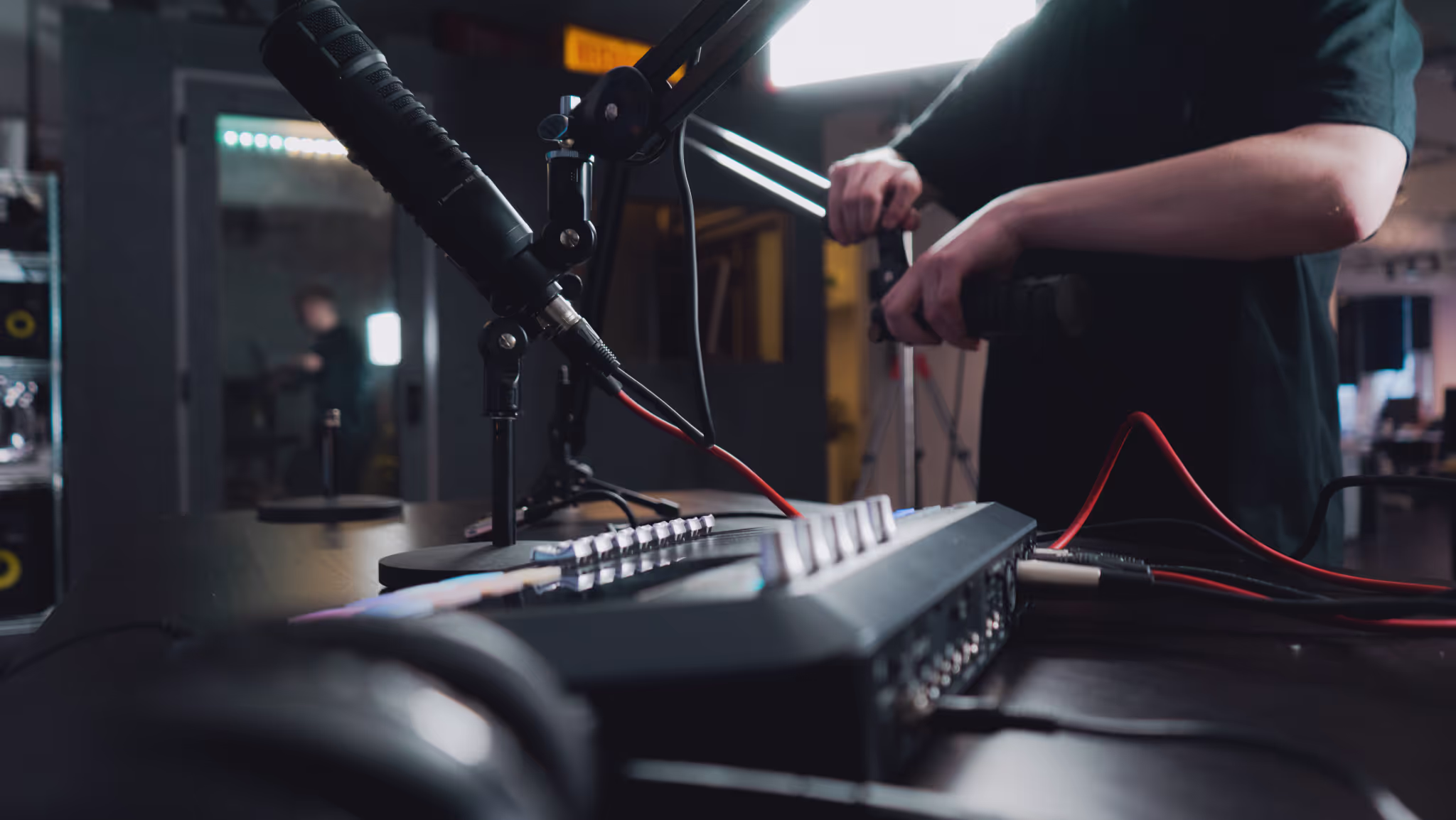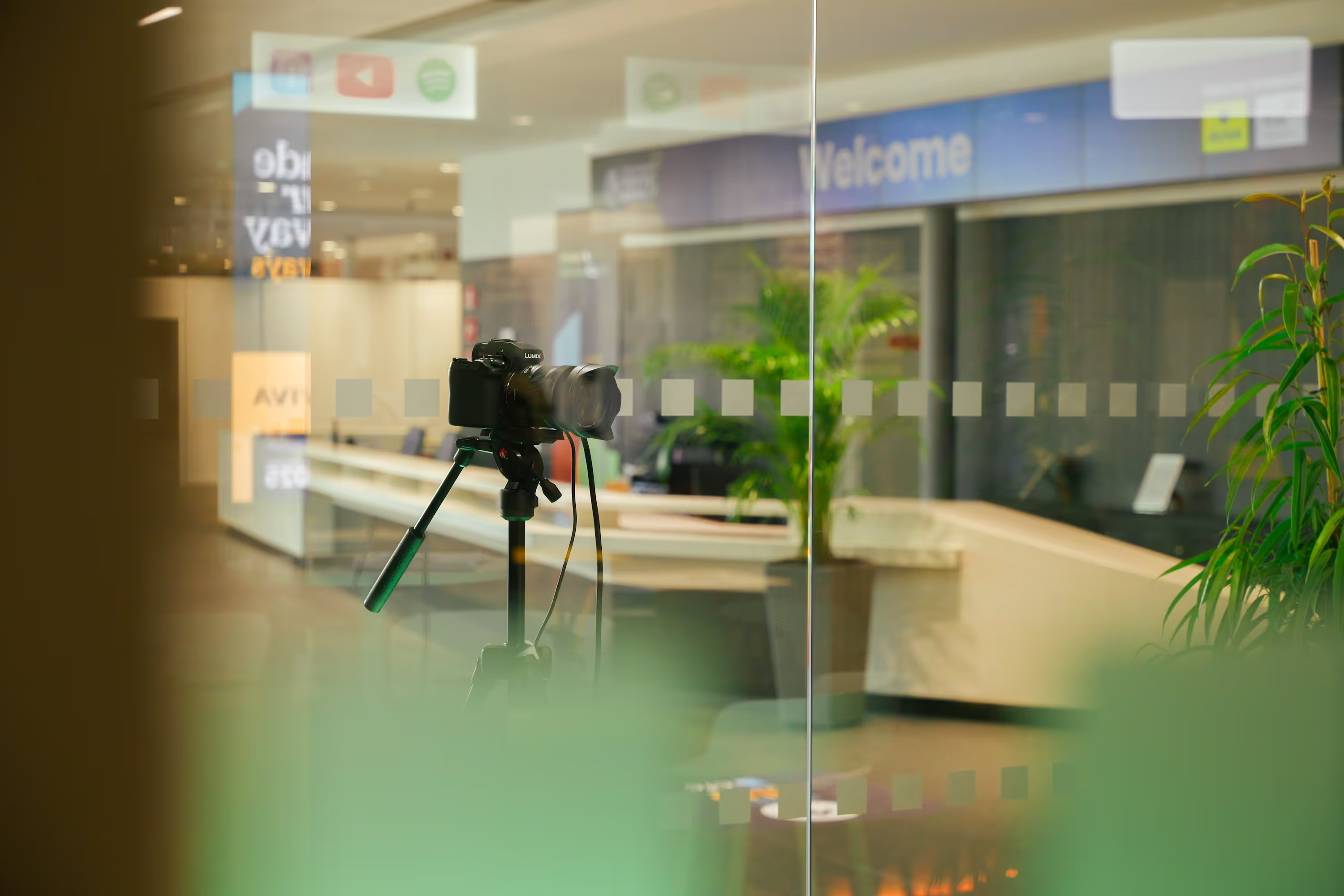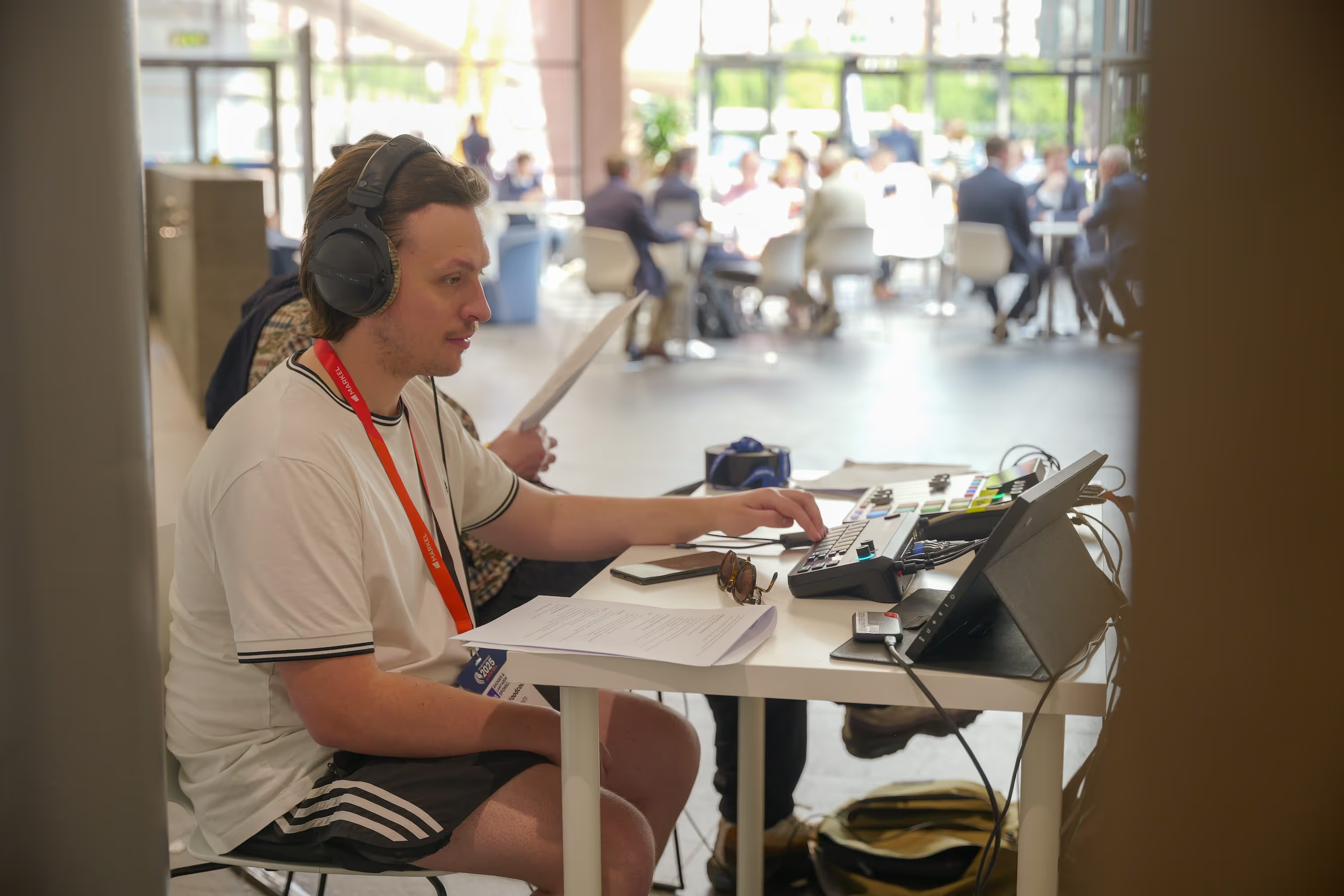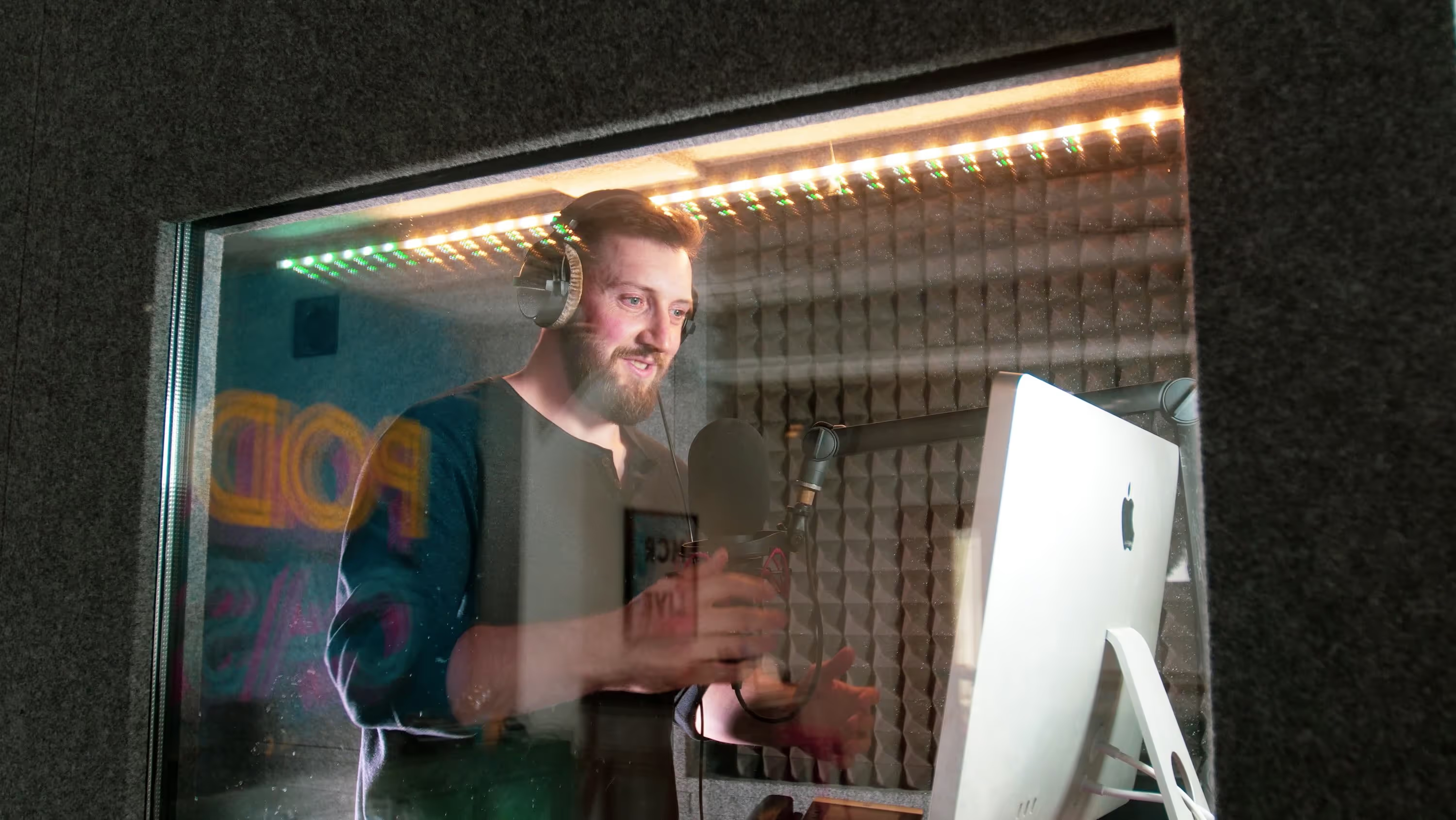
Let's Talk
Menu

Event podcasting has transformed the way conferences, expos, and live events engage with their audiences. Unlike traditional podcasts recorded in studios, event podcasting — sometimes referred to as on-location podcasting — captures the energy and immediacy of live events, providing a unique opportunity to connect with both in-person and remote attendees.
Let's face it, there are a lot of podcasts already out there and finding ways to make yours stand out is key to having a successful show.
One way you can do this is to break away from the generic podcast studio environment, and record your show at an event, on location. There’s so much more creativity, flexibility, and individuality in doing so.
We’ll go into the specifics of event podcasting recording shortly. But for now, let’s briefly touch base on the current state of podcast production. And we’ll go out on a limb to say that most of it is taking place in a studio environment - whether it’s a remote recording, a live stream, or an in-person interview between two (or more) people. The point being that listeners rarely get to experience anything else.
In other words, it could be time to leave the studio setting for something a bit more unique. Here’s everything you need to know when deciding if an on-location podcast recording is the right next step for your show…
Event podcasting is the practice of recording podcasts live at conferences, exhibitions, or other events. This can include interviews with keynote speakers, panel discussions, attendee insights, or behind-the-scenes commentary. Different to standard on-location podcasts, the focus is on capturing the energy and immediacy of live events, creating content that resonates with both in-person and remote audiences.

It’s pretty simple. An on-location podcast recording is when a podcast is recorded outside of a studio environment. So, it might be in a coffee shop, in the middle of a field, at a conference, or somewhere else. It’s generally a lot more creative, authentic, and personality-fuelled than a studio recording is. Plus it can also feel much more natural and less set up.
Bear in mind that an on-location podcast recording won’t be right for every show. And sometimes, a studio environment is much more fitting to a podcast’s tone, format, and theme. It’s important to really weigh up your options and figure out which one will work best for your show before committing to either one.
We should also note that an on-location podcast recording can be more costly than a studio recording. On top of that, you won’t be in a controlled environment. Meaning you’ll naturally run the risk of poorer-sounding audio, potential background noises, and general disruptions. That being said, the potential payoff from an on-location recording can absolutely be worth the time investment and added cost.
Now we’ve established what an on-location podcast recording actually is, it’s time to look at which situations it can be most beneficial to. Here are the main 4:
Podcasts recorded on location can really take advantage of the environments around them. If the atmosphere is captured well, it has the power to shape the tone and feeling of a show, and to transport listeners to a different world.
If your podcast is a documentary or audio-drama, for example, recording on location will play a huge part in setting the scene for listeners. It’s also immensely effective for elevating your general mise-en-scène. Sounds and ambiances can create an immersive and engaging listening experience for the audience. Animal noises, background chatter, sounds from the street, rockets launching into space. You get the idea. It helps the listener understand what’s going on, adding a layer of transparency to your content. This more often than not can’t be achieved in a studio environment.
If your podcast relates to a specific event, recording it on location is ideal. It could be a sports game, a conference or panel discussion, or a celebrity event, for example. Whatever it is, reporting on something in real time, and on location, can create a really unique listening experience for your audience. The inevitable background noise will give them a much closer feel for the atmosphere. Plus, there’ll be a heightened level of enthusiasm coming from the host(s) and guests. Overall, episodes will appear much more authentic and intimate - meaning listener retention rates will likely increase. Win-win.
You can hire Cue to bring the podcast experience to your conference or event - whether you want to interview speakers, talk to attendees, or just capture the atmosphere whilst producing audio content relevant to the industries you want to attract. To get in touch and book us for your event, click here.
If there’s a lot of host-to-listener interaction in your episodes, you might want to consider on-location podcast recording. Getting out of the studio and onto the street will give you a great opportunity to connect with audiences on a new level. Plus, it can often make for entertaining content. You’re much more likely to capture funny, off-the-cuff stories on location, than you are tucked away in a studio. Plus, real-life interactions are much more engaging, intimate, and interesting than virtual call-ins are.
Live podcasts are starting to become more and more popular, yet still remain a very niche format. Not many podcasters actually conduct live broadcasts of their episodes, or if they do, they usually use in-built tools on platforms like YouTube, Facebook, and Twitch.
But rather than doing it virtually, why not record it on location and in front of a real audience? It’ll be much more intimate, personal, and engaging. Not to mention it’ll allow you to create a deeper connection with listeners. You may even find that the feeling of being “on-air” motivates and energises you during the recording, which in turn can lead to better content.
Recording a podcast at an event requires careful planning:
You know what they say about failing to prepare. Putting a rough episode plan together can make all the difference between a smooth-running show, and one full of awkward blunders. On-location podcasts have much less room for error, and mistakes are a lot more noticeable than they are in a studio-recorded episode. A bullet point list of talking points will do the job. So if your mind goes periodically blank, you can quickly refer to it.
Let’s be honest here. An on-location podcast recording is much more on-the-go than a studio recording is. So investing in light, portable equipment is important. You still want good quality, but you don’t want the hassle of lugging around a heavy set up.
Make sure you do plenty of research before investing. We’d recommend buying an all-purpose portable recorder, like the Zoom H6 or the Nomono Sound Capsule. You can read more about why the H6 is a stand-out option here, or watch the video below to see the Sound Capsule in action.
Practice makes perfect. Before you actually record your podcast episode, it’s always a good idea to have a run through beforehand. Especially for the first episode. Doing so gives you a chance to go through your plan, iron out any shortcomings, and pre-set the overall flow in which you go into it. It’s also a good way of testing out your equipment and making sure everything’s working as planned.
On the day of the on-location podcast recording, you want to avoid getting thrown off by minor technical hiccups. So here’s a list of little checks that can make a big difference:

If you’re a bigger brand with a production budget to work with, you might decide to partner up with a production agency. An agency will handle everything from the initial concept stage, right down to promotion and distribution.
That’s exactly what we offer here at Cue Podcasts. And there’s absolutely no limit to where we can record - whether it’s audio-only, or video too. To give you an idea, below are examples of the work we’ve previously produced on location for events and shows:
The BIBA Conference is a leading UK insurance event that brings together brokers, insurers, and industry professionals to explore emerging trends and innovations. Cue Podcasts partnered with LimeBlue to deliver Markel a bespoke pop-up podcast pod at the event, providing a live on-location recording experience for attendees and showcasing in-real-time industry conversations.
Tech Open Air Festival (TOA) is a two-day event that started out as the world’s first crowd-funded festival, and has since evolved into a whopping community of like-minded tech enthusiasts coming together each summer. Speakers include some of the biggest tech leaders in the game, as well as a whole host of academics, creatives, and founders.

Cue Podcast is the only company dedicated exclusively to event podcasting. Here’s how we support events with our full-service approach:
Through our partnership with LimeBlue, Cue provides the professional equipment and expertise for bespoke pop-up studios designed specifically for live events. These studios are fully equipped and integrated, offering a seamless experience for attendees and speakers alike. They can be set up at any venue, from large conference halls to smaller, intimate spaces, ensuring your event podcast looks and feels professional.
We prioritise audio excellence in every recording. Our expert team ensures that all microphones, mixers, and recording devices are set up for optimal sound, delivering clear, broadcast-quality audio that is ready for distribution immediately after the event. This attention to quality ensures your podcast content reflects the professionalism of your brand.
Cue’s producers and technical staff guide you through every stage of the process, from planning guest lineups to post-production. We manage all aspects of the recording so you can focus on the content and engagement of your event. Our team’s experience ensures smooth operations, even in fast-paced, live environments.
Every event is unique, and Cue provides tailored solutions to fit your specific needs. Whether you are hosting a large-scale conference or a smaller workshop, we adjust our equipment, team size, and recording workflow to match your requirements. This flexibility ensures that your event podcasting experience is both efficient and effective.
Learn more about how Cue works with event organisers or explore our Tech Open Air pop-up studio partnership for event podcasting examples and insights into how to podcast live.
As mentioned previously, there are no limits to where we can record. Turn your next event into an evergreen experience by recording a live podcast on-location. Capture conversations in real-time, engage with both in-person and online audiences, and create reusable content that elevates your brand.
Ready to make it happen? Partner with Cue Podcasts to bring a professional and fully integrated recording production to your events— get in touch today and find out how we can make your bring your project to life.

Join our carefully curated newsletter packed with insights, tips and resources to help shape and share your stories.